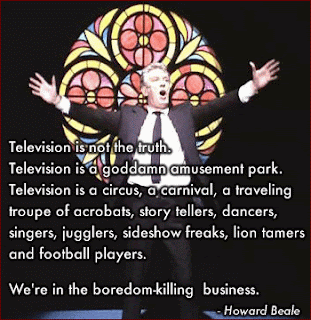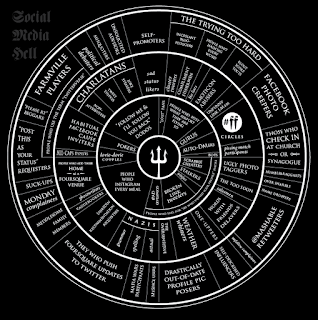Verisimilitude
Shall we play with reality today?
What is realism and reality? Some people just want to be entertained and don't care about the realism of a novel, movie, or play. For others it can be a major problem: If it isn't real then it ain't worth reading or seeing. They prefer the non-fiction type of stuff. A good book or movie can be realistic in one sense and unrealistic in another. It just means we have to break apart what realism really is.
What is real inside of a book or a television screen? Do the descriptions, settings and characters offer vivid realism to the eye? For some yes, others no. I suppose it depends on the perspective of the individual reader. Maybe it's not so much about providing an image of the outside world but maybe it's about mapping out a more private type of garden; an interior landscape for others to see into.
Let's look at realism a bit more closely. There are different kinds of realism to consider. How do we label what's real or unreal? In C. S. Lewis' - An Experiment in Criticism, he mentions two types of realism to look for:
Realism of presentation - How are things presented to the reader. Using descriptions that give feeling to our senses. Is the un-realistic aspect (such as something you would find in a SCY-FY or Fantasy novel) described with powerful descriptions that you practically believe their existence? Does the mood develop and establish a pace? It does matter how a story is presented because it shows how easy it is to play with reality. Is the tone and timber agreeable to the ear?
Realism of content - Content described through plotting. It deals with hypothetical probabilities. Sometimes those can get out of hand leaving the reader to put down the book as unrealistic. The setting can be one identifiable aspect. Isolating the theme can help identify the realism involved.
This post will add two more forms of realism to consider:
Psychological realism - This ties in with how characters are developed or treated. It draws out the feelings from past experiences, sketching out the personality from childhood on to the present or relevant parts of it. It tells the characters internal feelings and how conflict is dealt with.
Moral realism - Also ties in with character development. What is the character motivated by? Selfishness? If so, then fear is a major factor. Moral realism asks the reader to go beyond using snap judgments to form opinions. I guess Yoda really did know what the fuck he was talking about.
Considering how many angles a 'reality' can be told in maybe realism is more like an ideal than a reality. The eye of the beholder I guess...only, in today's reality it seems the big eye is a bunch of little screens telling everyone the same stories over and over again with different presentations. And our little eyes seem to be reading a dazzled 'reality' being depicted from this 'beholder' we all stare at so much.
That eye reminds of giant insects...
Don't forget the spider...
What is realism and reality? Some people just want to be entertained and don't care about the realism of a novel, movie, or play. For others it can be a major problem: If it isn't real then it ain't worth reading or seeing. They prefer the non-fiction type of stuff. A good book or movie can be realistic in one sense and unrealistic in another. It just means we have to break apart what realism really is.
What is real inside of a book or a television screen? Do the descriptions, settings and characters offer vivid realism to the eye? For some yes, others no. I suppose it depends on the perspective of the individual reader. Maybe it's not so much about providing an image of the outside world but maybe it's about mapping out a more private type of garden; an interior landscape for others to see into.
Let's look at realism a bit more closely. There are different kinds of realism to consider. How do we label what's real or unreal? In C. S. Lewis' - An Experiment in Criticism, he mentions two types of realism to look for:
Realism of presentation - How are things presented to the reader. Using descriptions that give feeling to our senses. Is the un-realistic aspect (such as something you would find in a SCY-FY or Fantasy novel) described with powerful descriptions that you practically believe their existence? Does the mood develop and establish a pace? It does matter how a story is presented because it shows how easy it is to play with reality. Is the tone and timber agreeable to the ear?
Realism of content - Content described through plotting. It deals with hypothetical probabilities. Sometimes those can get out of hand leaving the reader to put down the book as unrealistic. The setting can be one identifiable aspect. Isolating the theme can help identify the realism involved.
This post will add two more forms of realism to consider:
Psychological realism - This ties in with how characters are developed or treated. It draws out the feelings from past experiences, sketching out the personality from childhood on to the present or relevant parts of it. It tells the characters internal feelings and how conflict is dealt with.
Moral realism - Also ties in with character development. What is the character motivated by? Selfishness? If so, then fear is a major factor. Moral realism asks the reader to go beyond using snap judgments to form opinions. I guess Yoda really did know what the fuck he was talking about.
Considering how many angles a 'reality' can be told in maybe realism is more like an ideal than a reality. The eye of the beholder I guess...only, in today's reality it seems the big eye is a bunch of little screens telling everyone the same stories over and over again with different presentations. And our little eyes seem to be reading a dazzled 'reality' being depicted from this 'beholder' we all stare at so much.
That eye reminds of giant insects...
Don't forget the spider...




Comments
Post a Comment